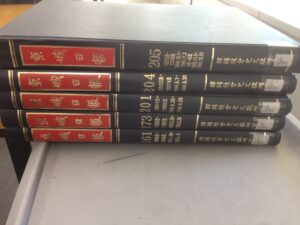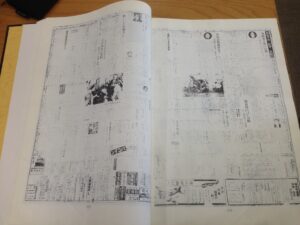For over two years, I have been passionately posting about Keijo Nippo (Gyeongseong Ilbo), a newspaper from the Japanese colonial era of Korea. My posts have covered transcriptions and translations of numerous articles, shedding light on the oppression and humiliation experienced by the Korean people under Japanese colonial rule.
My primary source had been an archive on the Internet Archive which was anonymously uploaded there in 2021. However, it had its limitations. Notably, the entire 1945 collection was missing, and many pages were either illegible due to poor scan quality or page deterioration.
I am finally in Seoul, enjoying my much-postponed vacation. While I am indulging in the delightful food scene and visiting the main tourist attractions, the highlights of my trip so far have been meeting my old violin teacher Mr. Simon Kim, whom I had last met 34 years ago as an elementary school, and spending a day at the National Library of Korea. To many, a library might not be a tourist attraction, but for me, it was a treasure trove. I was eager to see how the tone of Keijo Nippo evolved through 1945, marking the surrender of Imperial Japan, the liberation of Korea, and the onset of the US and Soviet occupation of the Korean peninsula.
I am elated to share that I successfully accessed the newspaper volumes I sought. With the assistance of the English-speaking staff, I obtained a library card, and after an hour-long wait, I was handed the volumes in the reference room on the third floor. However, I discovered that these volumes were just reproductions of scanned copies, and not the original copies. Nonetheless, some pages were of superior quality compared to the Internet Archive. I also managed to scan numerous articles from 1939 to 1943. Unfortunately, the 1944 articles were generally of poorer quality than those on the Internet Archive.
 |
| The volumes of Keijo Nippo that I browsed. |
The pages from August 15, 1945, onwards were particularly moving. This period marked the day of Korean liberation and the surrender of Imperial Japan. The newspaper's tone shifted dramatically, from calls for calm to announcements of Japanese repatriation, to becoming a mouthpiece for the American occupation. The stark contrast in the portrayal of Americans, from being vilified to celebrated, was striking.
But the most astonishing discovery was from November 1945. The Korean employees at Keijo Nippo apparently rebelled against their Japanese superiors and took over the newspaper's operations. As the ethnic Japanese staff bid their farewells in their statement in the November 1st issue, the Korean staff issued a statement in the November 2nd issue, pledging to continue writing in Japanese but with a renewed purpose - to uplift the Korean nation. This "Rogue Keijo Nippo" introduced many novelties, like Korean cartoons, which had never been in Keijo Nippo before, and they subtly Koreanized the Japanese language that they used. For example, they used 日人 instead of 日本人 for Japanese, and used 美軍 instead of 米軍 for US military. The rogue columnists wrote lots of essays directed at the remaining ethnic Japanese who were still not repatriated, condemning the "Japanese-Korean unification" ideology, Japanese imperialism and militarism, and Japanese supremacism that they had to endure for all these years. It seemed like they were expressing their pent-up frustrations and emotions that had been suppressed for a long time. Indeed, they were certainly harnessing their mastery of the Japanese language to tell us their true feelings for the first time. It did personally feel uncanny, since it felt like I was opening a time capsule, and I was discovering a message that was addressed to me, as if they wanted their voice to be heard in our world in 2023.
 |
| Many pages were like this, completely illegible |
I amassed a sizeable collection of snapshots of newspaper pages, but I will gradually transcribe and translate all my intriguing finds as time allows. I extend my gratitude to the library staff who were accommodating, even allowing me to photograph the materials, which was technically prohibited. This was a stark contrast to my experience at the National Diet Library in Tokyo, where photography was strictly forbidden, and I had to use their copy service.
I remain hopeful that these invaluable newspapers will be digitized in high resolution in the future, making them accessible to everyone without the need for a physical visit.




No comments:
Post a Comment